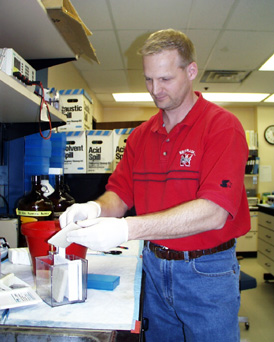 |
Steven J. Schreiner, Ph.D., a postdoc at the Eppley Institute, works with a technique that isolates and separates proteins from cells. |
Postdoctoral fellows may be among the unsung heroes conducting research at UNMC, but they are singing the praises of the university.
Results from a recently conducted survey show postdocs at the University of Nebraska, including those at UNMC, rank the university a great place to be a postdoc. Results of the Scientist magazine’s survey, “Best Places to Work for Postdocs,” were detailed in its Feb. 10 issue.
A postdoctoral fellow is someone who’s earned a doctoral degree then trains to pursue a research and/or teaching role in academia, or a research role in industry or government. A postdoc’s training can last from two to five years, but because of stiff competition for positions some postdocs do two training stints. Postdocs work with faculty, graduate students, technicians and technologists, and play a valuable role in supervising research.
Postdocs at UNMC
At UNMC, there are 101 postdoc research associates and fellows, in addition to 38 research associates who essentially fill the same kinds of roles, said David Crouse, Ph.D., interim vice chancellor for academic affairs and interim dean for graduate studies. “This is a 1,000 percent increase from seven postdocs and seven research associates in 1994.”
High scores
UNMC and other University of Nebraska postdocs contributed to the magazine’s survey, which placed NU among the top 10 institutions overall with Rutgers University; University of Miami; Princeton University; Dalhousie University; Medical College of Wisconsin; National Cancer Institute; University of California, Davis; University of Iowa and University of Kentucky.
|
|
NU also ranked among the top 10 institutions in the following five categories: most important factors, principal investigators, lab colleagues, quality training and quality mentoring.
The Scientist
The Scientist, an international news magazine that analyzes the issues and events that impact the world of life scientists, invited more than 30,000 postdocs to participate in its survey. About 2,800 useable responses were received from postdocs in the United States, Canada and western Europe. Though not a scientific study, the survey’s results, and the views expressed in it, provide a compelling portrait of postdocs’ goals and expectations.
Postdoc praises work environment
“The people (at UNMC) are very helpful and excited about science,” said Steven J. Schreiner, Ph.D., who is doing his first postdoc at the Eppley Institute. “They do whatever they can for you, whether you need to borrow stuff or get technical information.”
A native of Elmwood, Neb., Dr. Schreiner is working in the lab of Rob Lewis, Ph.D. “The competition isn’t cut-throat like at other places where there’s great emphasis on who has the most grants and who the big investigators are,” he said. Postdocs at UNMC have an opportunity to meet with individuals outside the institution, which gives them additional research perspectives, he said.
Open, collegial atmosphere
There’s a lot of good science and growing research programs at UNMC, Dr. Crouse said, plus strong core labs and “an open and collegial atmosphere that stimulates collaboration.” Dr. Crouse and others are reviewing and organizing policies and procedures to develop a career development program for postdocs.
Ron Rimerman, Ph.D., who’s been in Omaha 19 years and earned his doctoral degree in Santa Barbara, Calif., works as a technologist with postdocs in the UNMC department of pharmacology. UNMC is a good place for postdocs for several reasons, he said.
“There’s cooperation among different departments,” said Dr. Rimerman, who did two postdocs outside Nebraska including one at the University of California at Irving. “One person may not have all the knowledge on a project. Also, the university has a fair number of grants so therefore it’s possible to have the money to do the research.
“People at UNMC and in Omaha are pretty friendly and cooperative so you feel better working here than you may at a university on the east or west coast,” Dr. Rimerman said. “The group I work with is cooperative and gets along so well. People are very willing to help each other out to succeed and get their research project done. This also helps the other departments to build a reputation.”
Survey findings
Community and collaboration seem to be among the most important attributes that equate to postdoc satisfaction. The top institutions in The Scientist survey have taken extra steps to boost collaboration, not only among postdocs, but also among postdocs and graduate students, and postdocs and scientists from around the world. However, high ratings on collaboration do not interfere with the quality of research at the top-ranked universities, which employ some of the most highly cited life science researchers.
Criticisms of principal investigators often prevail in postdoc chat rooms and discussion groups. But The Scientist survey participants paint a more positive portrait of their professors and mentors: Many postdocs describe their principal investigators as effective leaders enmeshed in a demoralizing system, and give their departments and institutions low marks for failing to build the support networks necessary to boost the postdoc’s development.
Some 76 percent of the national survey participants said they could talk to their peers about personal and professional problems; 65.3 percent credited their colleagues with teaching lab skills; and 60.8 percent reported that lab members help each other balance work and family responsibilities.
Read details of the survey
To see details about the survey, visit http://www.the-scientist.com/postdoc/postdoc.htm.